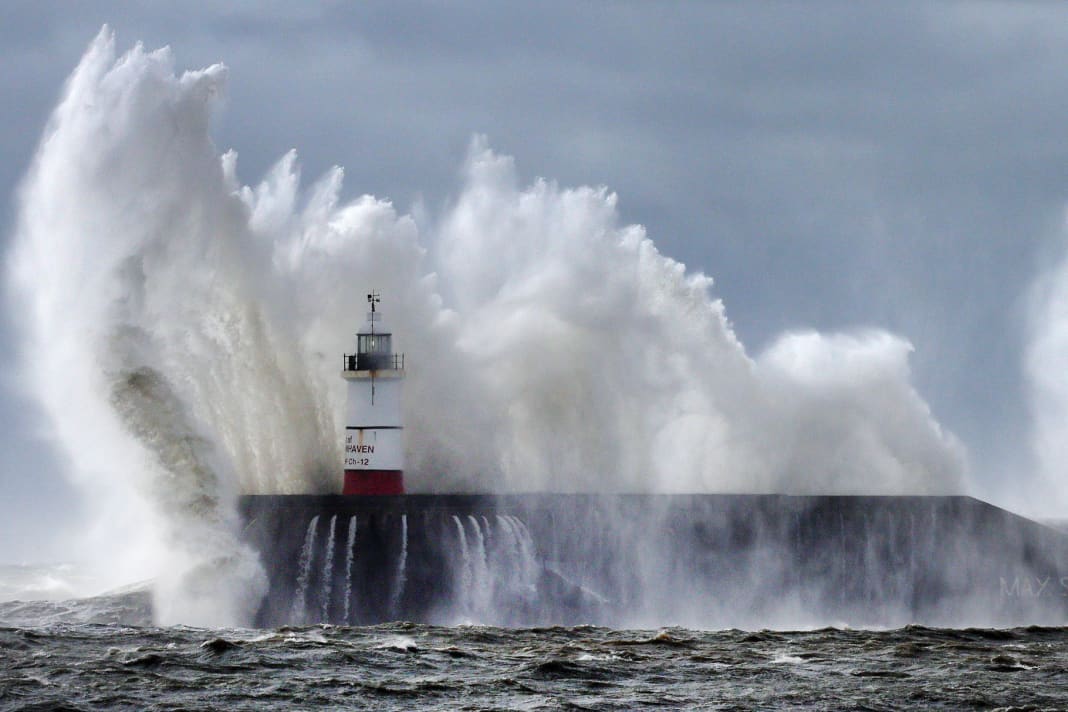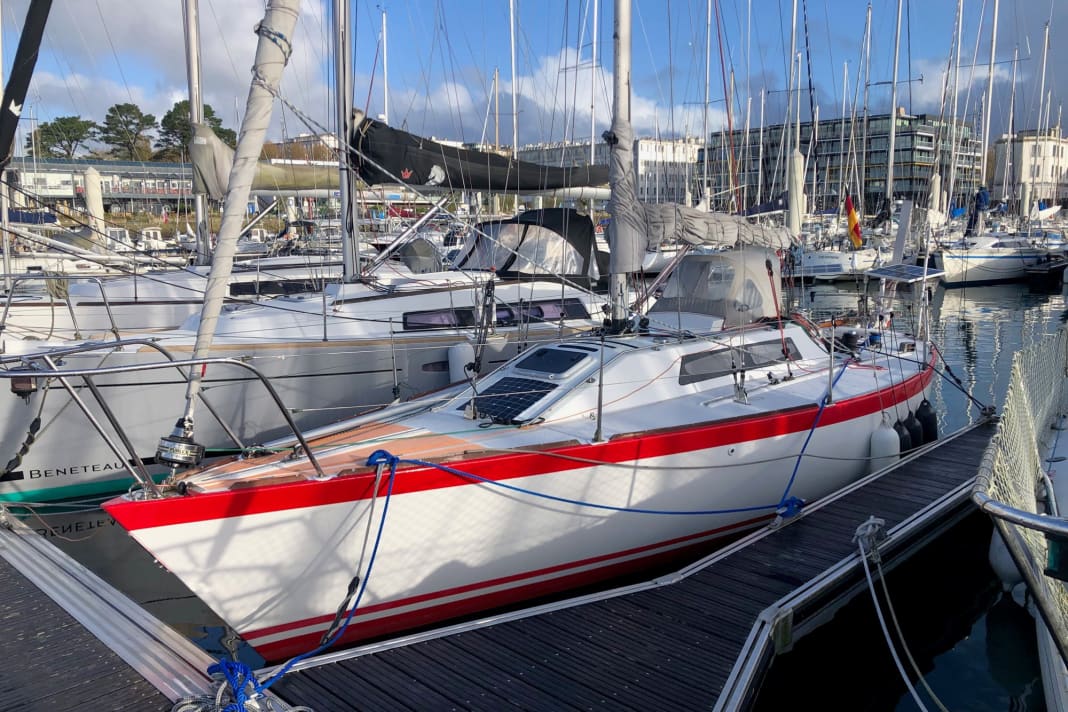





Ciarán ravaged the coasts. Up to 1.2 million households in France were affected by power cuts, trees fell and people died. A 21 metre high wave was measured off the Finistère department. The foothills were also felt on the German North Sea coast. There are still no detailed reports of damage in the harbours. However, author Philipp Hympendahl was on site in Brest with his "African Queen" and describes his experiences to YACHT.
After his failed campaign to take part in the Global Solo Challenge, which was recently held in La Coruña, Hympendahl first had to lick his wounds.
Fortunately, he still had his old boat, a 9.20 metre half-tonner from the 1980s. After taking part in the Midsummersail, he had the boat out of the water for two months to completely overhaul it and equip it as well as possible for longer journeys. It now has a larger battery capacity, solar cells and a decent autopilot alongside its Pacific Windpilot. Otherwise there are no frills, no heating, no fridge and only the most necessary technical aids. In addition to a tablet, AIS and VHF, he also has an IridiumGO for weather forecasts and tracking on his homepage: www.seesucht.online.
His plan is not to have a defined goal, but a few ideas and options, initially heading south until he "no longer feels the lack of heating".
He wants to develop as a sailor and realise his long-term goal of sailing non-stop around the world.
Ciarán, my one-night stand in Brest
On my way south, I arrived in Camaret-sur-Mer at night via Le Havre, Cherbourg and Roscoff. I spend the first few days there in the outer harbour in the Port de Plaisance.






I quickly make friends with a fun group of Danes and an Englishman; together we are four boats heading south before winter. Our WhatsApp group is called "The Biscay hopefuls". That's Gustav and Bertil, two likeable young Danes aged 21 on a Comfort 32, Paul, an Englishman without a life raft and with great confidence, and Nicolas on a 13-metre steel boat. Together we wait in Camaret for a favourable weather window, so we watch the forecasts on all possible platforms and exchange ideas. Unfortunately, the forecasts don't get any better, but instead intensify more and more into what will later become a hurricane. In the meantime, we have moved our boats to the harbour near Camaret, where the boats get less swell and have better protection from the wind.
However, the jetties there are only anchored to floating chains and move with the tide.
The forecast scales are beginning to take on ever rarer colours, it seems a bigger storm is coming. My mooring lines are jerking in the cleats and the movements of the boat are causing me serious concern. I talk to other sailors, fishermen, the harbour master and of course my friends and try to make a decision, which I find very difficult. The "Biscay hopefuls" want to stay in Camaret. I discover a post by Sebastian Wache on Facebook: "The hurricane heading towards France is undergoing what is known as bombogenesis. In other words, a rapid deepening of the core pressure and thus an extreme intensification of the wind."
The boat is moved to escape Ciarán
Models see wind speeds of up to 160 km/h and waves of up to 13 metres.
My decision has been made, even if it means breaking up the group, I'm going to Brest on Tuesday, 31 October 2013. I catch a favourable moment with lots of rain but few gusts and an hour and a half later I'm in the Marina du Château.
Unfortunately, they have assigned me the most exposed berth by phone and later via channel 09, but I only really realise this once I am completely moored. After consulting with the harbour office, I move again and am now lying with my bow to the jetty facing south-west, with two large sailing boats in front of me - the perfect berth for what is to come.
After a quiet night with plenty of sleep, I explore the area a little and start to prepare my boat. I secure the solar panels, which I have attached to the stern, with tightly stretched Dyneema, wrap a long rope around the tarpaulin of the main and secure the headsail, which I had furled very tightly in high winds. I didn't fold the sails down, but secured them well. I can simply fold down the small sprayhood if necessary. I fitted rubber dampers to the bow rigging in the wind direction and doubled them. First the forces go into the damper, and then a second mooring line takes hold, so it doesn't hit the cleats and is doubly secured. A few spring lines and a good fender and some gin for the gods, that's all I can do.
In the centre of Ciarán
Alain, a French friend from Lorient, calls me with the news that Brest will probably be hit the hardest. A French storm warning pops up on my mobile phone, red alert. A harbour employee informs all sailors that it is forbidden to spend the coming night on his boat. I then speak to other sailors who will be staying and also decide not to leave my boat alone. Towards the afternoon, the tension slowly mounts; according to the forecasts, the worst is due to come at around 1 a.m., fortunately at low tide. I treat myself to a beer in the harbour pub and then it's off to the boat. Family, friends and the digital community are worried on all channels, offering advice and warnings. I have to decide for myself, and ultimately I can change my decision at any time and leave my boat if necessary, but only in an emergency.
It's getting darker in the harbour. The colours green, blue and grey seem to have overlapped and are speckled with rain showers. Masts begin to dance in the first gusts. The first notes of a soft whistle are played by the harbour orchestra. My back aches as I stand at the companionway and look out over the harbour. I don't have any wind instruments, so I'm used to making judgements based not on numbers but on my own observations, and these are in line with what the forecasts show.
The night with Ciarán
During the course of the evening, relatively calm moments alternate with strong gusts that can also bring heavy rain. The wind constantly creates new sounds on its way through masts, halyards, shrouds and sails. The whole harbour becomes an instrument, like a large synthesiser that is being tuned. My adrenalin rises with the noise. I estimate the gusts to be up to 50 knots in the late evening. Boats sway back and forth, masts threaten to touch, nature shows its claws, and there's nothing I can do but stand on the companionway and take a painkiller. When would I leave my boat, what would I take with me, should I pack a grab bag in the harbour? These are the thoughts, triggered by personal messages: "You have to leave your boat", "You might put others in danger", "Take care of yourself".
I gradually get used to the boat's strong vibrations, which are gently absorbed by my mooring lines and fenders, and my "African Queen" dances with the storm Ciarán. Like a tango dancer, she picks up the signals and transforms them into harmonious movements. I am gaining more confidence in the harbour and my berth, but where is the limit?
Ciarán plays the organ in the rigs
Ciarán keeps playing new notes and increasing the volume; I've never heard whistling like this before. Boats hit the finger jetties, the first furling lines break, and the headsails are flapping, the flapping is added as a new continuous sound. Ciarán has reached Brest, my joy is limited, at least it won't get any worse from now on. The predicted gusts of 70 knots have arrived. The moon comes briefly through a hole in the clouds and adds to the drama of the moment. My old barometer has moved the pointer once again, to a place where it has never been.
In oilskins and boots, ready to leave the boat at any time, I remain at the companionway and gaze into the loud, wild, always the same picture. Every time it calms down and I think about going to sleep, another gust comes with the same force and ferocity. It doesn't let up until around 4 a.m. and I finally get some sleep. In the morning, strong winds feel like calm, and I walk around the harbour and take a look at the damage. Thanks to good forecasts, a safe harbour and prudent boat owners, relatively little has happened. Some damage to boats, a collapsed tri has tipped over, a boat is listing, and some sails can only become bags. That's relatively little for the strength of the storm. I'm another experience richer and very happy and grateful to have survived unscathed. My Danish friends have some damage to their yacht in Camaret, perhaps they would have decided differently in hindsight.
On Marine Traffic you could see how unimpressed the commercial shipping industry is by Ciarán. Commerce knows no storm.

